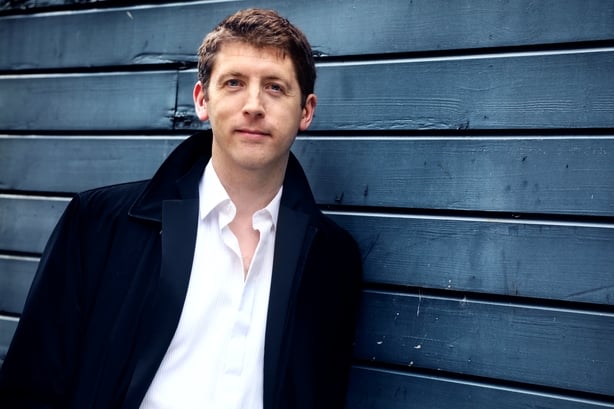Artistic Director and classical pianist Finghin Collins is curating a three concert chamber series to celebrate the music and centenary of composer Charles Villiers Stanford at the National Concert Hall. We asked Finghin the BIG questions . . .
We need your consent to load this Spotify contentWe use Spotify to manage extra content that can set cookies on your device and collect data about your activity. Please review their details and accept them to load the content.Manage Preferences
The three concerts feature music by Stanford and his contemporaries, pupils and musical heroes and will feature guest musicians to include mezzo-soprano Sharon Carty, flautist Ríona Ó Duinnín, clarinettist John Finucane, baritone Benjamin Russell, the ConTempo Quartet. Concerts take place on Sunday 3, 10 and 17 of March.
The new series follows the release of Cushendall, a collection of Irish song cycles by Charles Villiers Stanford by mezzo-soprano Sharon Carty, baritone Benjamin Russel and Finghin Collins on the SOMM Recording label.
Tell us three things about yourself . . .
I love foreign languages and speak many and feel very liberated when I can express myself freely in a language that is not English. I speak French, German, Spanish, Italian and Russian, and have ambitions to improve my Irish, with a bit more practice.

I love being busy and feel fortunate to have a career as a musician and artistic director which will not force me to retire, ever, unless I want to.
I am generally upbeat, cheerful and optimistic, except during pandemics and lockdowns which cause me to be miserable, anxious and utterly out of sorts.
How would you describe your music?
I don't write my own music; I play music written by other composers; in one concert you could hear me perform music spanning three centuries. The repertoire for piano is absolutely vast; we can play alone, with orchestra, with other instrumentalists, with singers, with other pianists etc. We will ever only tip the surface of the repertoire that exists. So, one word to describe 'my’ music would be diverse. Variety is so important.
Who are your musical inspirations?
The principal inspiration of my youth was my piano teacher John O’Conor, who taught me from when I was six until I finished college aged 22! I would also cite my sister Mary as an inspiration, she was my first teacher. I started learning piano when I was three and she remained a huge support until she left Ireland when I was 13. We remain very close. And then of course there are all the classical composers who inspire me, Mozart, Bach, Beethoven, Schubert, Brahms, Chopin, Tchaikovsky. And I am inspired, both consciously and subconsciously, by many of the musicians I am fortunate to work with.
What was the first gig you ever went to?
No idea, my mother took us to so many concerts, it has all merged into a blur. I have so many mixed memories of sitting in the choir balcony of the NCH in Dublin listening to all kinds of concerts, orchestral, solo piano etc and it all left its mark. One of the most memorable concerts I attended as a teenager was the Japanese pianist Mitsuko Uchida playing the final Schubert sonata at the NCH. I totally fell in love with the piece and her interpretation of it. I have subsequently played the piece extensively myself, and every time I do I am reminded fondly of that first experience.
What was the first record you ever bought?
Again, my memory is sketchy on that one, but all I can say is that I spent my early teenage years acquiring CD recordings of the great operatic repertoire and devouring them one by one. Mozart and Verdi operas have remained my constant friends and are a source of huge inspiration to me. I then discovered Tchaikovsky’s opera Eugene Onegin which is one of my favourite pieces of music ever and which inevitably reduces me to tears when I see it live.
What's your favourite piece right now?
A miraculous setting for voice and piano of Yeats’ poem The Lake Isle of Innisfree by the relatively unknown composer Muriel Herbert. The evocation in the piano part of the lapping lake water is simply mesmerising. You can hear this in the second concert of the Stanford Centenary Series on 10 March 10 with Sharon Carty (mezzo-soprano) accompanied by myself at the piano. Muriel Herbert was one of many composition students of Stanford in London.
Favourite lyric of all time?
RTE lyric fm - a wonderful radio station providing much-needed relief from the awfulness of the world today. They do a terrific job on a small budget and are to be applauded, supported and sustained. Alternative answer - "for peace comes dropping slow".
If you could only listen to one song for the rest of your life, what would it be?
I think that would be very tiresome. As I said above, variety is hugely important to me. Even the best masterpieces need shuffling! If I had to choose right now, perhaps Von Ewiger Liebe by Brahms, an ode to unshakeable love, stronger than iron.
Where can people find your music/more information?
Best place to go for information on me and my varied activities is my website. More specific and detailed info on the Stanford Centenary Series, taking place at the NCH on Sundays 3, 10 and 17 of March is here. Please note the concert on 17 March takes place at 5.00pm owing to the St. Patrick’s Day parade.
Alan Corr

